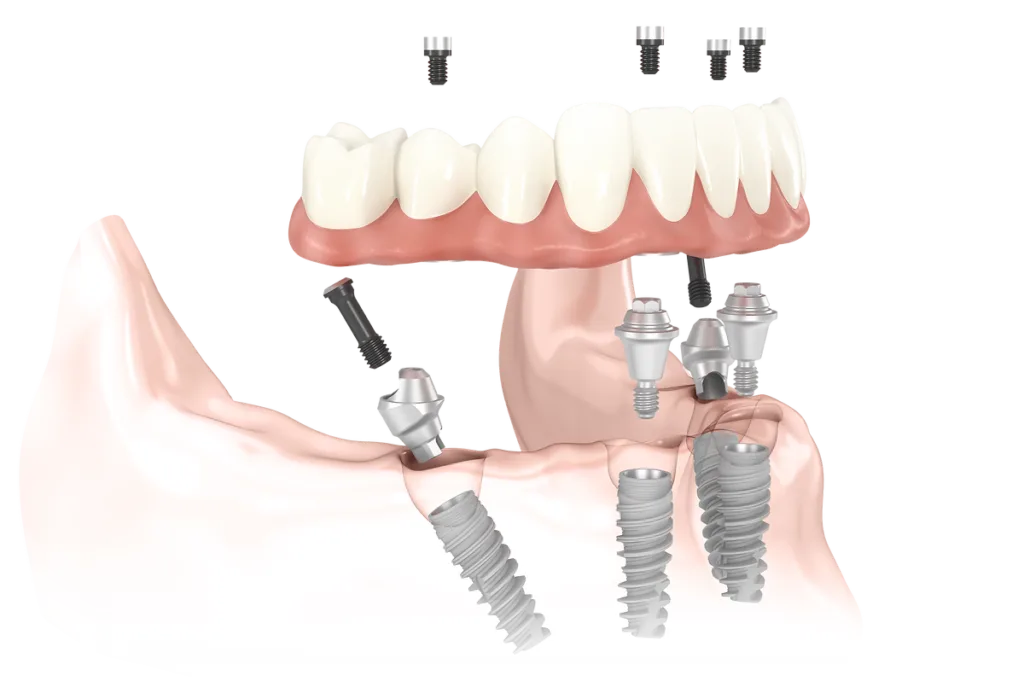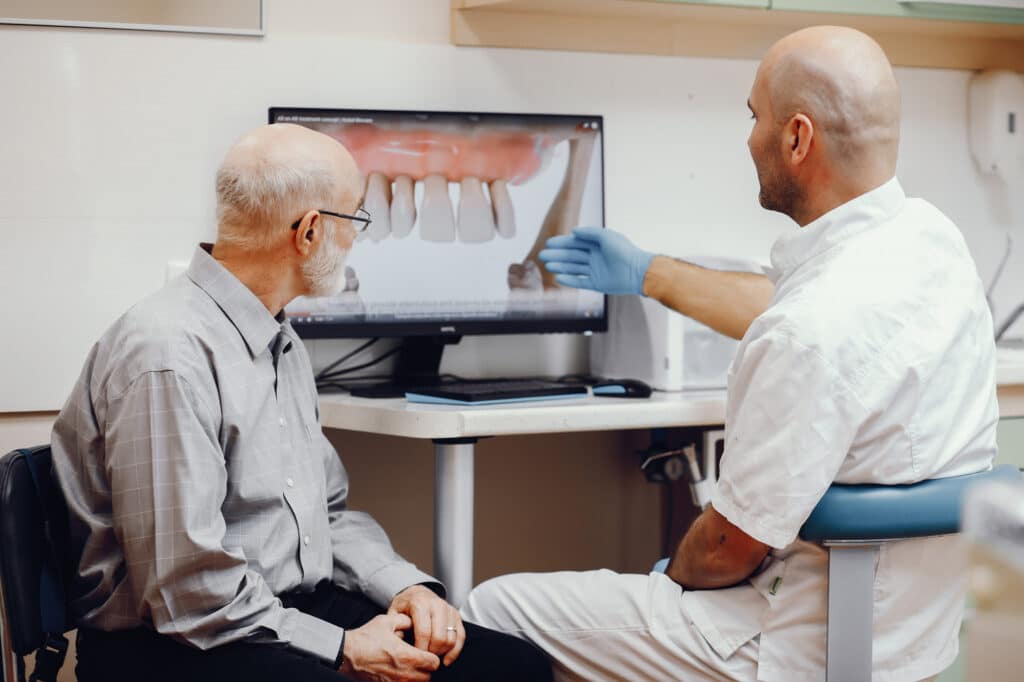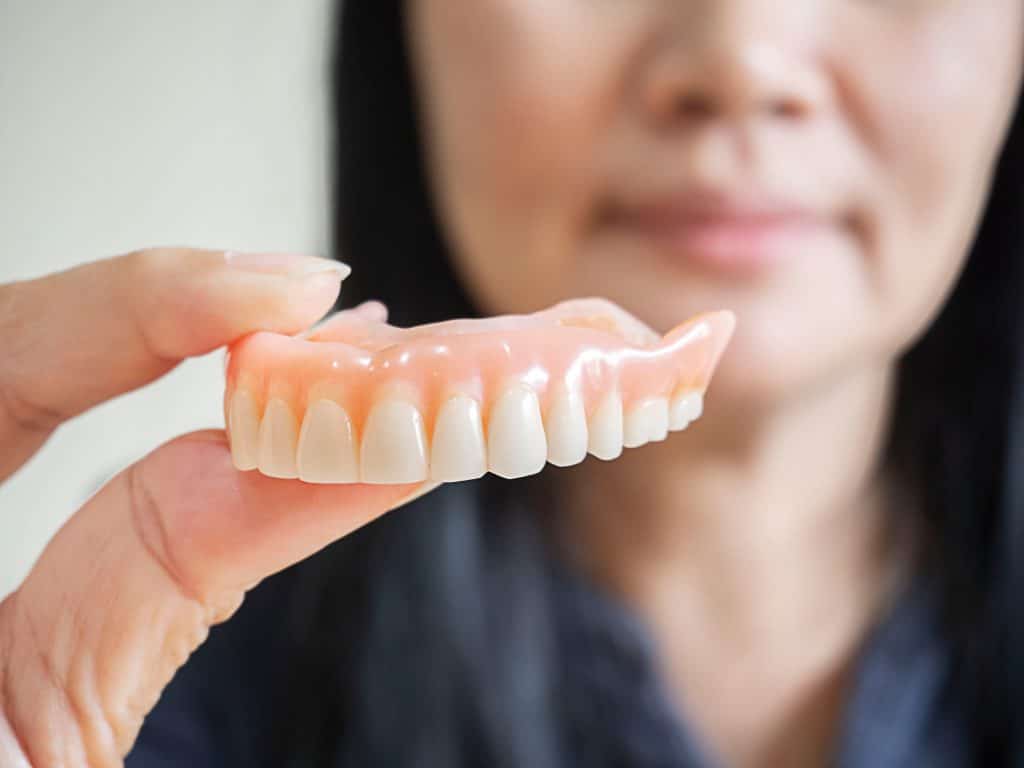Dental Implants vs Dentures: Making the Right Choice
Implants vs dentures: choosing the right solution for replacing missing teeth is crucial for both your oral health and overall well-being.
With advancements in dental technology, patients now have more options than ever when it comes to restoring their smiles.
Among these options, dental implants and dentures are two of the most popular.
Each has its own set of advantages and considerations, making the decision a deeply personal one that depends on various factors such as lifestyle, budget, and health condition.
In this blog, we will delve into the pros and cons of both dental implants and dentures, helping you make an informed choice for your needs.

What are Dental Implants?
A dental implant is a titanium post that is surgically placed into the jawbone, acting as an artificial tooth root. This post is then used to support a dental crown, bridge, or denture.
Dental implants are designed to fuse with the jawbone, providing a strong foundation for replacement teeth. The fusion process, known as osseointegration, takes place over several months, during which the titanium post becomes a permanent part of your jaw.
Advantages of Dental Implants
- Look and feel like natural teeth
- Long-lasting
- Prevent bone loss in the jaw
- No restrictions on food choices
- Easy to maintain
Dental implants offer a natural-looking and feeling solution, closely mimicking the appearance and function of real teeth. They are also known for their durability, often lasting many years or even a lifetime with proper care.
Additionally, by replacing the tooth root, they help maintain the jawbone’s integrity, preventing the bone loss that typically occurs with tooth loss. With dental implants, patients can enjoy their favorite foods without worrying about slippage or damage, and they require similar maintenance to natural teeth, like regular brushing and flossing.
Disadvantages of Dental Implants
- More expensive upfront cost
- Requires surgery
- May not be suitable for everyone
- Can take several months to complete
The main drawback of dental implants is the cost, which can be significantly higher than other tooth replacement options. The surgical nature of the procedure also means it may not be suitable for individuals with certain medical conditions or those who are not comfortable with undergoing surgery. The process from implant placement to final restoration can take several months, requiring patience and multiple visits to the dentist.

What Are Dentures?
Dentures are removable replacements for missing teeth and can be made of acrylic or metal. They are custom-made to fit your mouth and are held in place by suction, adhesives, or clasps that attach to the remaining teeth. Dentures have been used for many years and have seen significant improvements in comfort and appearance, making them a viable option for many people.
Advantages of Dentures
- Less expensive than dental implants
- Non-invasive procedure
- Can be made quickly
- Suitable for those with significant bone loss in the jaw
Dentures are a cost-effective solution for tooth replacement, often requiring a smaller upfront investment compared to implants. They are a non-invasive option, which can be appealing to those who want to avoid surgery.
Dentures can also be fabricated relatively quickly, providing a faster solution to restore the smile. For patients with significant bone loss, dentures might be the only viable option, as they do not require a sturdy bone foundation for placement.
Disadvantages of Dentures
- Can be uncomfortable and take time to adjust to
- May need frequent adjustments
- Can affect speech and eating
- Requires daily maintenance and cleaning
Dentures can take some time for the wearer to adjust to, and they may never feel as comfortable as natural teeth or implants. They often require adjustments and relining to maintain a proper fit, especially as the jawbone changes over time. Dentures can slip or move, causing difficulties with speech and eating, and they require diligent daily cleaning to prevent issues such as bad breath or infections.
Dental Implants vs Dentures: Cost
One of the most significant factors that influence the decision between dental implants and dentures is the cost. Dentures are generally the more affordable option upfront, with a full set of dentures costing anywhere from $600 to $5,000. On the other hand, dental implants can cost anywhere from $1,000 to $3,000 per tooth, making it a more expensive option initially.
However, it’s essential to consider the long-term costs. Dentures may need to be replaced every 5-10 years, and the cost of repairs and maintenance can add up over time. Dental implants, on the other hand, have a success rate of over 95% and can last a lifetime with proper care. When factoring in replacement costs, maintenance, and potential lost time from dental issues, implants can be a more cost-effective choice for some patients in the long run.
Dental Implants vs Dentures: Longevity
Dentures typically have a lifespan of 5-10 years, after which they may need to be replaced due to wear and tear or changes in the jaw structure. Dental implants, on the other hand, are designed to fuse with the jawbone, making them a permanent solution. With proper care, they can last a lifetime, making them a more cost-effective option in the long run.
While dentures can wear down and require replacement, dental implants are made from durable materials that can withstand daily use without the same level of degradation. It’s also important to note that the longevity of dental implants not only benefits the patient’s wallet but also their quality of life, reducing the frequency of dental visits and procedures over time.
Dental Implants vs Dentures: Comfort and Convenience
When it comes to comfort and convenience, dental implants have a clear advantage. Since they are designed to look and feel like natural teeth, they do not require any adhesives or clasps and are held securely in place by the jawbone. Dentures, on the other hand, can be uncomfortable and may take some time to get used to. They also require daily cleaning and maintenance, which can be inconvenient for some individuals.
Dental implants eliminate the discomfort and insecurity associated with loose-fitting dentures. They allow patients to speak, laugh, and eat without the fear of their teeth shifting or falling out. Furthermore, the routine care for dental implants is much like that for natural teeth, making them more convenient for patients who prefer a low-maintenance solution.

Dental Implants vs Dentures: Eating and Speaking
Dental implants have a significant advantage when it comes to eating and speaking. Since they are held securely in place, there are no restrictions on the types of food you can eat. Dentures, on the other hand, can affect the ability to chew and may require you to avoid certain foods. They can also affect speech, especially if they do not fit correctly.
With dental implants, patients can enjoy a varied diet, including foods that are often problematic for denture wearers, such as apples, corn on the cob, and steak. The stability of implants allows for a natural biting and chewing motion, which can significantly improve the dining experience. Additionally, because implants are anchored in the jawbone, they do not shift or slip, helping to preserve clear speech and confidence in social situations.
Dental Implants vs Dentures: Bone Health
One of the most significant disadvantages of dentures is that they do not prevent bone loss in the jaw. When teeth are missing, the jawbone can deteriorate, leading to a sunken appearance in the face. Dental implants, however, stimulate the jawbone, preventing bone loss and preserving facial structure.
The stimulation provided by dental implants mimics that of natural tooth roots, promoting healthy bone maintenance and growth. This not only helps to preserve facial aesthetics but also contributes to the overall oral health of the patient. In contrast, long-term denture use without implants can accelerate jawbone loss, potentially leading to further dental complications and the need for more extensive procedures in the future.
Making the Right Choice
When deciding between dental implants and dentures, it’s important to consider your individual needs and circumstances. If cost is a significant factor, dentures may be the more affordable option upfront. However, if you want a long-term, permanent solution that looks and feels like natural teeth, dental implants may be the better choice.
It’s also essential to consider the health of your jawbone. If you have significant bone loss, dentures may be the only viable option. However, if your jawbone is healthy, dental implants can help prevent bone loss and preserve your facial structure. Lifestyle factors, such as your diet, oral hygiene habits, and personal preferences, should also play a role in your decision.
Ultimately, the best way to make the right choice is to consult with your dentist. They can assess your oral health and provide personalized recommendations based on your needs and circumstances. A comprehensive evaluation, including X-rays and possibly a CT scan, will help determine the best course of action for your specific situation.
Conclusion
Dental implants and dentures are both viable options for replacing missing teeth. While dentures may be more affordable upfront, dental implants offer a permanent solution that can last a lifetime. Ultimately, the decision between dental implants and dentures should be based on your individual needs and circumstances, so be sure to consult with your dentist to make the right choice for you. Making an informed decision will help ensure that you are satisfied with your tooth replacement for years to come.
Contact Legacy Dental Today
At Legacy Dental, we understand the importance of making informed decisions about your oral health. Our team of experienced dentists is here to provide you with the guidance and personalized care you need to choose between dental implants and dentures. Whether you have questions, need a consultation, or are ready to take the next step towards improving your smile, we’re here to help.
Don’t wait to achieve the comfort, functionality, and confidence that come with the right dental solution. Contact Legacy Dental today to schedule your consultation and start your journey to a healthier, happier smile.



